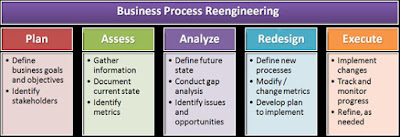CHAPTER 3 : STRATEGIC INITIATIVES FOR IMPLEMENTING COMPETITIVE ADVANTAGES.
Supply chain management.
Definition: Involve the management of information flows between and among stages in a supply chain to maximize total supply chain effectiveness and profitability.
Importance of supply chain management :
1. Decrease the power of its buyer.
2. Increase its own supplier power.
3. Increase switching cost.
4. Boost customer service.
5. Create entry barrier.
Customer Relationship Management (CRM)
Definition: Involve managing all aspects of a customer's relationship with an organization to increase customer's loyalty and retention an organization's profitability.
- Identify types of customers.
- Understand the needs of customer.
- Treat each customer as an individual.
BUSINESS PROCESS REENGINEERING
Definition : The analysis and redesign of workflow within an between enterprises.
Principles of Business Process Reengineering
Finding Opportunity Using BPR
BPR risks
- BPR requires 3rd order change.
- Very expensive to implement.
- BPR sees that operational processes are not glamorous or highly valued.
ENTERPRISE RESOURCE PLANNING (ERP)
Definition : Intergrates all department and functions throughout an organization into a single IT system so that employess can make decisions by viewing enterprisewide information on all business operations.
Importance of Enterprise Resource Planning
- ERP supports upper level management by providing information for decision making.
- ERP creates a more agile company that adapts better to change. ERP makes a company more flexible and less rigidly structured so organization components operate more cohesively, enhancing the business—internally and externally.
- ERP can improve data security. A common control system, such as the kind offered by ERP systems, allows organizations the ability to more easily ensure key company data is not compromised.
- ERP provides increased opportunities for collaboration. Data takes many forms in the modern enterprise. Documents, files, forms, audio and video, emails. Often, each data medium has its own mechanism for allowing collaboration. ERP provides a collaborative platform that lets employees spend more time collaborating on content rather than mastering the learning curve of communicating in various formats across distributed systems.






No comments:
Post a Comment